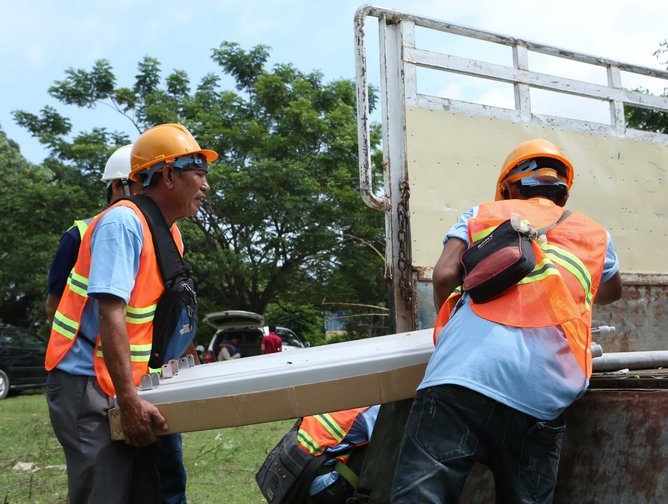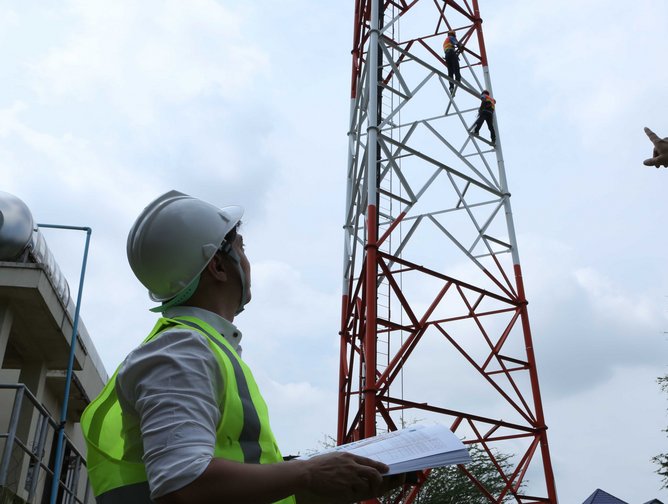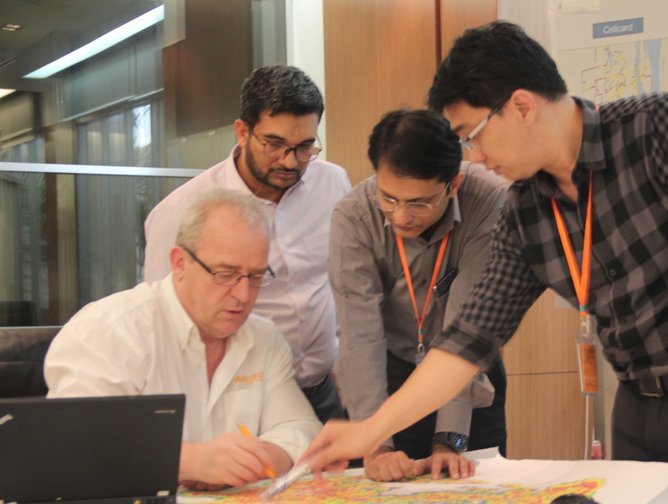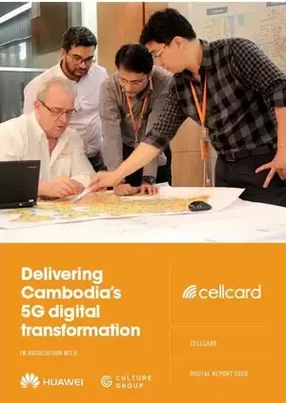Cellcard: delivering Cambodia’s 5G digital transformation
Digital technology and the greater use of data have irreversibly changed virtually every industry, and the telecoms sector is no exception. Indeed, the advent of one specific innovation has forever changed the way that we communicate, bank, work and engage with the world, as well as our expectations as consumers: the smartphone.
“The smartphone has become one of the most important tools in our lives,” shares Ian Watson, CEO of telecoms leader, Cellcard. “The smartphone is your connection to the digital world. It is the means to purchase items and pay bills, the vault which holds the data of your life via photographs and videos, an assistant which tells you where you need to be, and can act as the advisor of how to get there. It can measure your health and advise you on issues, and is the instrument which allows you to receive your correspondence and entertainment.”
Cellcard is at the forefront of telecommunications innovation and digital transformation. The business, which is fully Cambodian-owned and operated, is committed to providing access to mobile technology and connectivity to all Cambodians, regardless of their location. In doing so, it has risen to become the preeminent telecoms company in the Kingdom - it was the first to offer nationwide coverage and prepaid services in 1998, the first to provide a 3G network with streaming services in 2005 and, in 2010, the first to launch a mobile payments platform.
More recently, Cellcard is now the operator of Cambodia’s fastest 4G network, with the Kingdom experiencing a 36% growth in mobile data subscribers since its launch.
In short, Cellcard sets the standard for telecoms innovation in Cambodia. With Watson at the helm, however, it doesn’t rest on its laurels. The business is currently dedicated to driving and leading Cambodia’s ongoing digitalisation through the development and launch of the Kingdom’s first 5G network. As Watson reveals during the course of our conversation, despite its technology-first approach, this has also seen Cellcard undergo its own transformational journey.
“We view Cellcard as moving away from the traditional mobile network operator model to being a full digital lifestyle service provider,” he explains. “We’ll make sure that your device - whether a handheld or wearable device - is truly connected to the world. It’s all part of a wider ecosystem that we’re building that we call our ‘walled garden’. When you’re in our garden you’ll be able to access all the services you need. It will be a great place to be that’s driven by the latest technology, and you won’t want to leave.”
The industry is changing rapidly, particularly in Cambodia. Watson explains that while this is in part driven by the evolution of technology, it is also a product of the broader change in the Kingdom. “It’s not the biggest that survive, it’s those that adapt the quickest. As we move into the digital world, it’s vital to be up to speed with those changes and all of the dynamic developments around 5G and other telecom innovations.
“The key driver of change, particularly in Cambodia, is the increasing appetite for large data,” he continues. “If you look at the history of the country, there has never been a fixed line infrastructure. Instead, as we’ve moved into the digital age, Cambodians have gone straight to mobile broadband, mobile data and connectivity. At the same time, we have a very young demographic - 60% of the Cambodian population is under 30 years of age. This is generation X. It’s people who want to be connected, to be social, bank and shop through their devices, it’s an absolutely modern lifestyle and we have to be sure we’re providing for that.”
Cambodian lifestyle and the culture that pervades throughout the Kingdom is important internally, too, says Watson. Indeed, as the company navigates the rollout of 5G, he finds the strong cultural aspect of Cellcard to be vital to progress. “One of the things that attracted me to Cambodia is the culture, it’s so rich and diverse,” he explains. “It is for sure going to be a strong force in the global digital transformation, and a leading proponent of the digital world. We, as a company, are very much part of that journey culturally too.
“We pride ourselves on our Cambodian heritage; 99% of our employees are Cambodian,” Watson continues. “But you can’t be digital on the outside unless you’re digital on the inside. As a result, and as part of this journey to the 5G digitialsing of Cambodia, we’re having to re-engineer and reprocess virtually the entire company from the top down. And it’s not just about processes, it’s about people, having good digital change managers and a concerted effort to bring the whole company into the digital world.”
It is also, says Watson, about building and developing technology that is embedded in that Cambodian heritage. “For example, we’ve created a Cambodian Chat app called Mith Laor, which means ‘good friends’. The app includes a TV platform to host video and other content, a payment platform that sees us explore more lifestyle-type services, and more. It’s all part of this broader end-to-end digital platform that we will deliver through the 5G rollout, and it all works through a smartphone app. To ensure this is best-in-class we’re already looking to integrate other innovations, such as AI, integrated voice assistants, chatbots and robotics”.
As to the implementation, Watson explains that Cellcard’s network is pre-5G enabled, with all 5G testing already being concluded some two years ago. The company is currently working with the government ministries on a test and releasing spectrum that, once completed, will see it “having built one of the best, most dynamic digital 5G platforms not only in Cambodia, but in the world”, says Watson.
Cellcard has several sites that it has been running for some time as part of that process. The company recently used its 5G infrastructure to provide an important service as part of Cambodia’s efforts to combat the COVID-19 pandemic. In March it announced the Kingdom’s first use of 5G for a telemedicine service at four locations across Phnom Penh to help with critically ill patients. The service allowed doctors to use video conferencing technology linked to mobile phones and devices across Cambodia to assess patients in real-time. This extends to the provision of real-time clinical care, counselling and therapy, as well as education for consultants and support for medical teams.
“It’s part of what we are trying to do as we move into a full 5G environment,” Watson explains. “We’re looking at using the technology for remote diagnostics in all provinces, to support medical staff and for other diagnosis and treatment services such as recognising cataracts and more. It’s all been helped and underpinned by our existing, superfast 4G network too, which remains the best performing in Cambodia.”
Naturally, any significant transformation journey brings challenges and a degree of change management. For example, says Watson, a company can’t digitalise if it doesn’t have the technology. Cellcard has invested significantly in its network to facilitate the rollout of 5G, but also in building a team of people with the correct mindset and ambition to drive the Kingdom’s digitalisation.
On the technologies that will enable this, Watson explains that “to have a dynamic 5G network it has to be accessible. It must be fast and deliver everything that we promise. But it’s not just about speed, it’s about understanding and incorporating all of the new opportunities that can be gained from a 5G world, so things like network splicing, enhanced mobile capabilities and the Internet of Things. Second to that, is ensuring you have the necessary platforms to deliver all of the products and services. This includes a robust cloud computing platform and watertight cybersecurity practices.”
The latter, he explains, is crucial as networks and data grow. “In a true digital world, it won’t just be your handset that you should be concerned about, it’ll be every device in your home,” he states. “For organisations like us, it means the need to authenticate a large number of devices latching to the network, ensuring robust perimeter defences so that people can’t get into the network in the first instance and more. We invest huge amounts into our security protocols - we simply have to.”
For this, and other areas of technology, Watson states that partnerships prove important. A good technology partner, he says, must fit Cellcard’s digital vision and be prepared to work towards the long-term ambitions of the company and the Kingdom. He cites a long-term partnership with Microsoft as a good example, through which Cellcard has access to the company’s video conferencing and other technologies.
Looking ahead to a 5G-enabled Cambodia, Watson elaborates on the benefits that the technology will bring, not just to consumers but also the Kingdom’s enterprise economy. “The B2B market is, in my opinion, one of the biggest selling points of 5G,” he states. “We’re already setting up a dedicated 5G digital enterprise department to focus solely on the B2B and SME sectors and we are investing heavily in data centres so that enterprises can manage and have access to the vast amounts of data that they will need.
“For Cambodia, the future is very exciting. It’s a young, dynamic county and it has huge potential that can be realised by digitalisation. 5G will underpin the true digital transformation of the Kingdom and we’re plugged in and ready to deliver on that vision,” he concludes.




